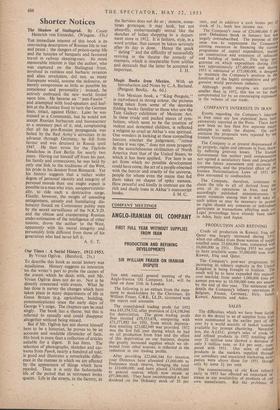Shorter Notices
THE immediate interest of this book is its convincing description of Russian life in war and peace ; the dangers of prison-camp life and the luxuries of, banquets and favoured travel in railway sleeping-cars. Its more memorable interest is that the author, who was captured on the Stalingrad front, involved in ruthless and barbaric invasion and alien revolution, did not, as many Europeans would, assume the defensive, or merely compromise as little as possible his conscience and personality ; instead, he actively embraced .the new world forced upon him. He became an " anti-Fascist '• and attempted with loud-speakers and leaf- lets at the Russian front to turn the German lines, intact, against Hitler. Later he was trained as a Communist, but he would not accept Russian barbarism and bureaucracy' as a necessary part of it, and, complaining that all his pro-Russian propaganda was belied by the Red Army's atrocities in its advance through Germany, he fell from favour and was detained in Russia until 1947. He then wrote for the Tagliche Rundschau in East Berlin for nearly two years. -Having cut himself off from his past, his family and connections, he was held by only one link to the traditions of the WeSt, his pride in his descent from Bismarck. Yet his history suggests that a rather wider degree of personal identity and integrity of personal morale than one might expect is possible to a man who tries, unopportunistic- ally, to ride such a destructive surge. Finally, however, the weight of unending antagonisms, anxiety and humiliating dis- honesty forced on Communist public men by the secret surveillance of the N.K.V.D. and the obtuse and exasperating Russian under-estimation of the intelligence of other nations, drove the author to the West, apparently with his moral integrity and personality little different from those of his generation who had never left it.
A. E. T.


































 Previous page
Previous page